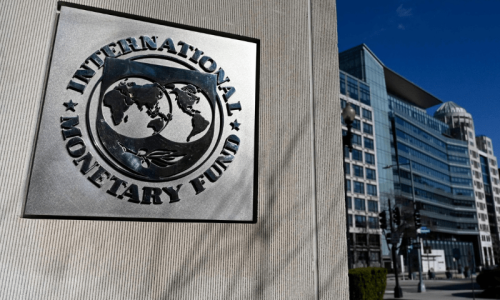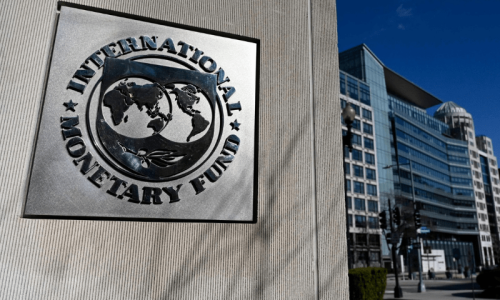
The caretaker government is jubilant, feeling a sense of vindication. The market, in turn, embraced the International Monetary Fund (IMF) agreement with warmth. The deal unlocked the critically needed second $700 million tranche, bringing the total disbursement to $1.9 billion, within the $3bn bailout framework deemed essential for Pakistan’s financial stability.
While the business community expressed qualified support, ordinary Pakistanis dread further hardships due to the inherent conditions of the package. The IMF obligates the government to implement stabilisation policies, leading to increased taxes, levies, elevated energy rates and reduced development spending.
To address the substantial budget deficit, the donor often recommends a halt on government recruitment and advocates leaner state-owned enterprises before a potential sale. Unfortunately, the resulting impact, including inflation, job losses and cuts to development spending, disproportionately hurt the working masses.
It’s not surprising that people in Pakistan resent the IMF. The memory of all previous programmes is unpleasant, marked by the anticipation of gains that never materialised despite enduring the pain of stabilisation“, observed an analyst.
While the feel-good sentiment is there in the economy, the IMF obligates the government to implement policies that lead to inflation and joblessness
Since July 2023, when the IMF approved a nine-month $3bn bailout package for Pakistan, fuel, electricity and gas prices have risen, contributing to crushingly high inflation and unemployment rates. Since the caretakers assumed power in August, petrol and diesel prices increased by Rs58.6 and Rs55.7 till the end of September.
Although revised down in October and November, the overall balance remains higher by Rs16.2 and Rs23.2 compared to mid-August prices. Both electricity and gas tariffs rose astronomically, impacting even the lifeline consumers of gas, who were charged Rs10 per month and will now pay a minimum of Rs500.
In response to inquiries about the growing economic discontent, Dr Shamshad Akhtar, Caretaker Finance Minister, conveyed over phone, stating, “Economic and price stability will pave the way for benefits for the poor.”
Upon successfully engaging with the IMF team, she remarked, “There has been a broad recognition of the government’s commitment to the IMF standby agreement and its strict adherence to stipulated quantitative and structural benchmarks.
“Following the standard operating procedure, the second tranche of $700 million will be released after approval of the IMF Management and Executive Boards.
“The staff-level agreement and its forward-looking directives will bolster macroeconomic stability, fostering growth and facilitating expansion in social safety nets for the vulnerable.”
After reviewing Pakistan’s situation, the IMF said, “A nascent recovery is underway, buoyed by international partners’ support and signs of improved confidence”. It anticipated a further decline in the inflation rate, which fell from 38 per cent in May to under 27pc in October, but cautioned about susceptibility to external risks, including intensification of geopolitical tensions, resurgent commodity prices, and further tightening in global financial conditions. It advised focusing on building resilience.
The capital and currency markets celebrated the IMF deal by propelling the Pakistan Stock Exchange’s benchmark index to over 57,000 mark, and the rupee showed resilience by gaining value against the dollar, albeit marginally.
Ehsan Malik, CEO, Pakistan Business Council, voiced the corporate sector’s apprehensions about the escalating cost of doing business. He responded to criticism of the Special Investment Facilitation Council (SIFC) and emphasised the inevitability of a 24th programme next year.
“In our discussions with the IMF, we have consistently championed the cause of equitable distribution of tax, be it in the realms of energy or other areas. We contend that the front-loaded targets merely address the symptoms and not the cause of Pakistan’s problems, which primarily stem from a lack of political will and the Federal Board of Revenue’s (FBR) capacity to expand the tax base while curbing theft, transmission and distribution inefficiencies in the energy sector.
“The IMF’s measures disproportionately burden the formal sector, fostering greater incentives for evasion by the informal sector. Likewise, an orthodox monetary policy, lacking fiscal expenditure controls, pursues inflation driven by cost-push, supply-side pressures and devaluation impacts. This results in a higher cost of funds for the formal sector, borrowing from banks, collectively hindering the formalisation agenda of the economy.
“This time, the IMF has been more receptive, focusing on taxing untaxed sectors for sustainable revenue. We wish a similar approach had been taken for energy tariffs.”
Defending the new body, he stated, “The SIFC is a pragmatic solution to government decision-making fragmentation and red tape. Both we and the IMF envision sustainable institutional strengthening, and we believe the SIFC could pave the way”.
“We remain concerned about the looming debt challenge as standby assistance and deposits from friendly nations offer temporary support, yet a near-term funding gap persists. Clarification is needed on the proposal regarding the debt reprofiling. While a challenge for an incoming government, the caretaker regime could seek advice from sovereign debt advisors, with potential private sector assistance to fill any gap in government resources.”
Former Federation of Pakistan Chamber of Commerce and Industry President Nasser Hayat Magoon cautioned, “Further power hikes may force closures of textile units as it will become impossible to compete with countries like China, India, Bangladesh, Vietnam and Indonesia in the global market. While welcoming fair taxation for retailers and realtors, the question remains whether FBR can effectively implement it.”
Karachi industrialist Majyd Aziz derided the convoluted language and numerical jargon in economic statements that elude common understanding. While criticising the recurrent increase in power rates, he offered support for the SIFC.
“The recent gas rate increase has severely impacted domestic and industrial consumers. The mention of the necessity of free and fair elections is a positive development, removing uncertainty. IMF’s scrutiny of SIFC is puzzling. The rationale of its establishment is to create a comfort zone for mega investors, recognised for sustainable guarantees and prioritising indigenous sectors like agriculture, mining, and information technology.”
Published in Dawn, The Business and Finance Weekly, November 20th, 2023














































Dear visitor, the comments section is undergoing an overhaul and will return soon.